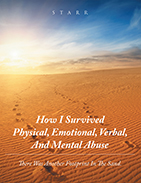
 |
How I Survived Physical, Emotional, Verbal, And Mental Abuse: There Was Another Footprint in the Sand
by Starr
AuthorHouse
Though a time of innocence, joyful exuberance, and whimsical curiosity for many, one's childhood can be marred with negative experiences that carry on into adulthood. In this narrative, Star journeys back through her abusive and neglect-filled childhood with the primary purpose of depicting the silver lining, the hope that lies in discovering the Bible and Jesus Christ. Integrating faith and her life experiences, Starr demonstrates the intestinal fortitude and courage required to keep pushing on until the metamorphosis happens from a struggling, abused child to a strong and confident individual.
At the center of Starr's work is a focus on redemption, reconciliation, and forgiveness. Despite suffering tremendous neglect for weeks on-end at her father's hands and growing up without her mother, the author emphasizes the importance of storge—family love. Regardless of the circumstances that led to estrangement, there is no risk great enough, she suggests, that should prevent a parent from reconnecting with one's children. What makes this work compelling, particularly for readers of faith, is the integrative biblical reference that illuminates one's understanding. In the case of reconciliation and retaliation, Starr uses the story of Jacob and Esau to demonstrate the importance of letting God control any sentiments like retribution or vengeance.
While the author underscores the importance of forgiveness, she speaks about the process of reaching this point with conviction. Healing begins with compassion and dignity, both of which are rooted deeply in faith. As a finale for her piece, Starr produces a pertinent poem inspired by George Floyd and all abuse victims. While on the surface the poem is geared toward Black Lives Matter, it epitomizes Starr's mission to help all abused individuals overcome, grow, and prosper through faith and prayer.